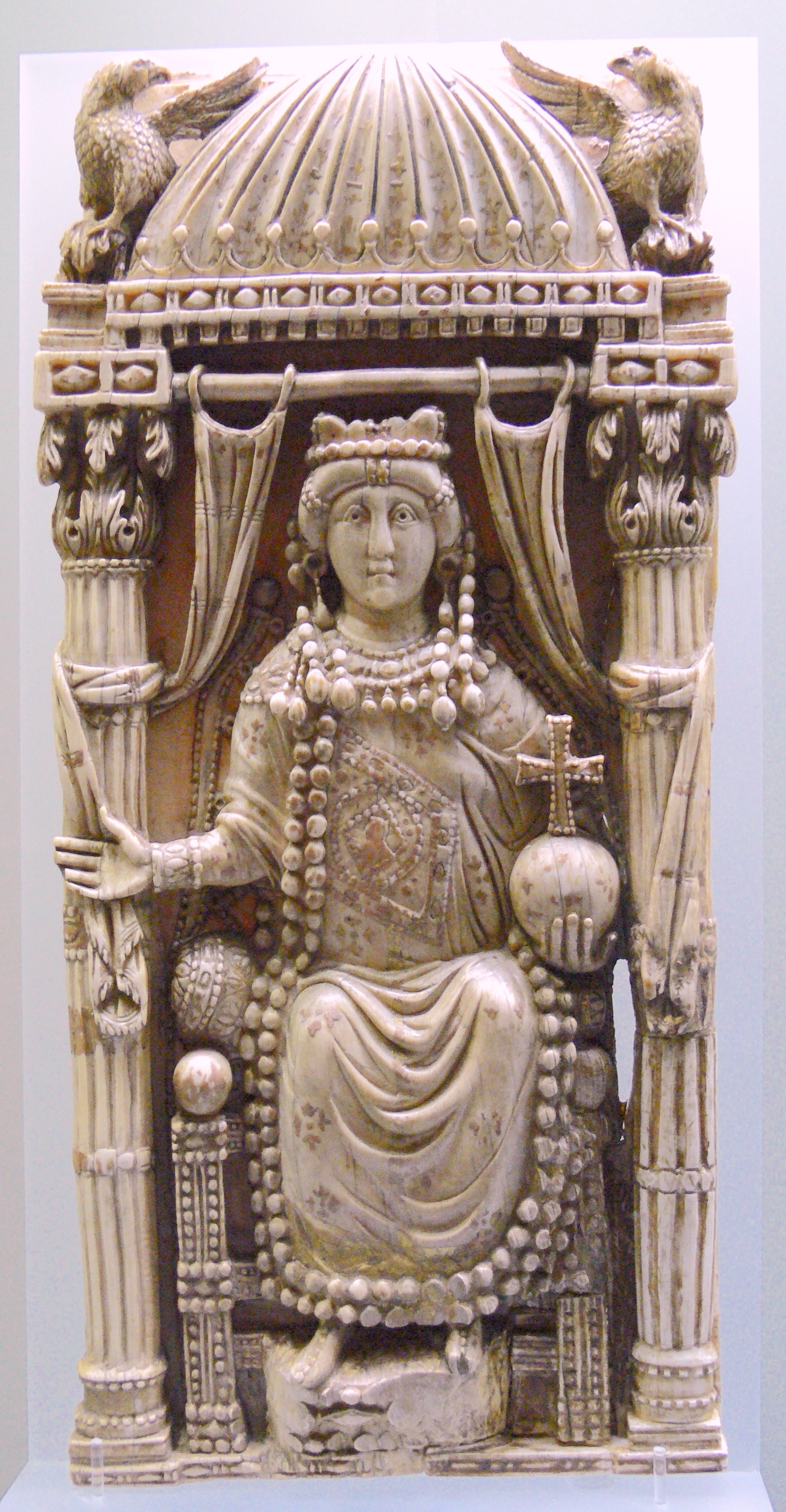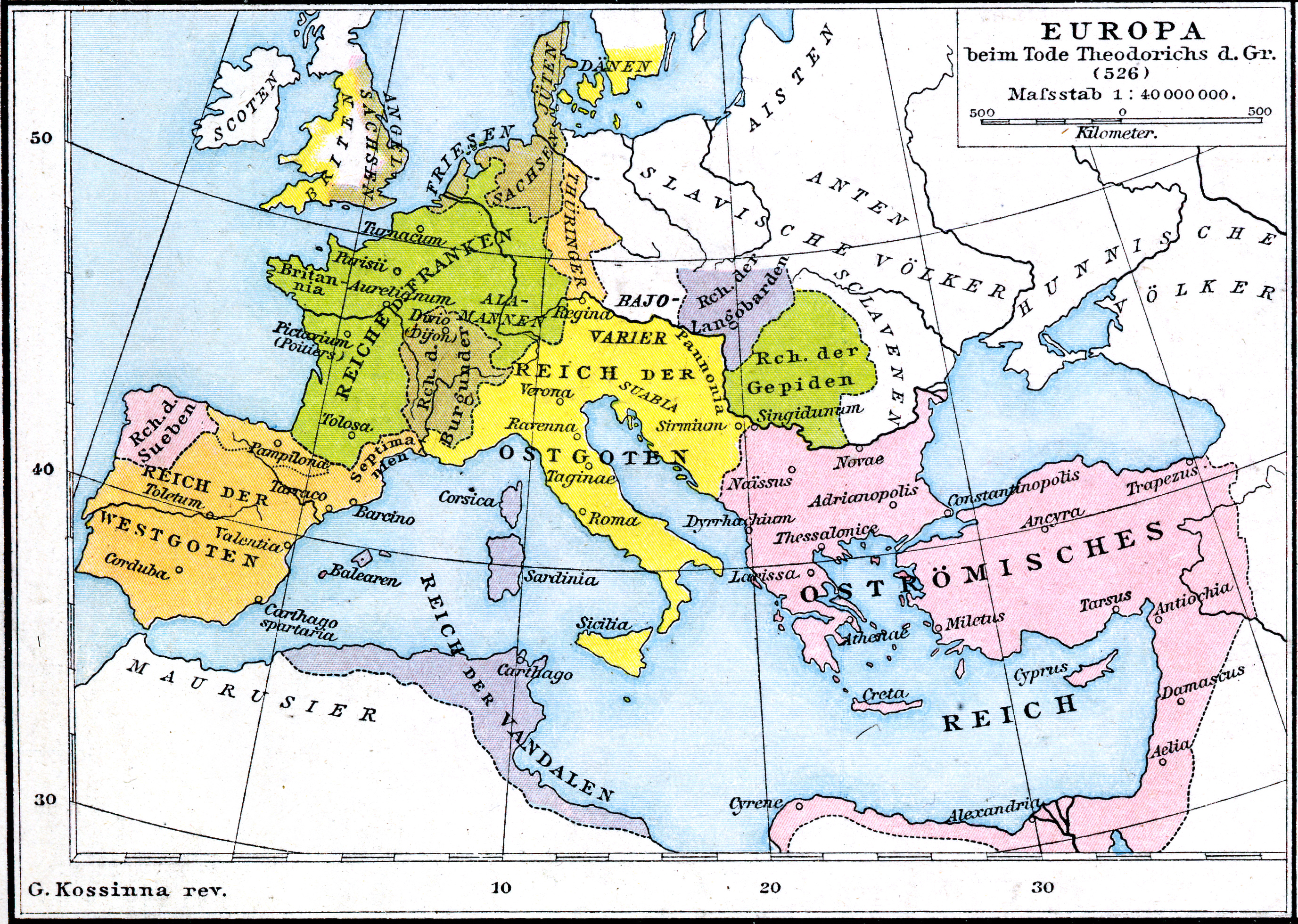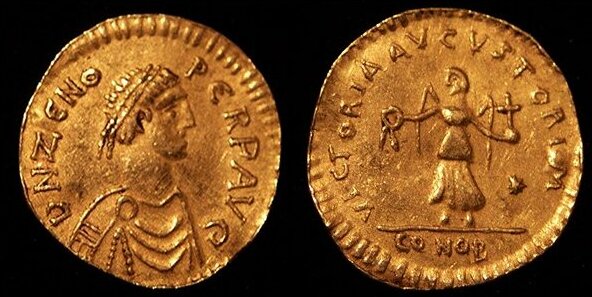|
484
__NOTOC__ Year 484 ( CDLXXXIV) was a leap year starting on Sunday (link will display the full calendar) of the Julian calendar. At the time, it was known as the Year of the Consulship of Venantius and Theodoricus (or, less frequently, year 1237 ''Ab urbe condita''). The denomination 484 for this year has been used since the early medieval period, when the Anno Domini calendar era became the prevalent method in Europe for naming years. Events By place Byzantine Empire * July 19 – Leontius, Roman usurper, is crowned emperor at Tarsus (modern Turkey). Empress dowager Verina sends a letter to the governors of the Diocese of the East and the Diocese of Egypt for support. He is recognized in Antioch and makes it his capital. * Leontius raises a rebellion against emperor Zeno, who also faces a revolt from the Ostrogoth king Theodoric the Great. He sends an army to Syria, but is defeated by the Byzantine general Illus. * Zeno signs a peace treaty with Theodoric the Gre ... [...More Info...] [...Related Items...] OR: [Wikipedia] [Google] [Baidu] |
Zeno (emperor)
Zeno (; grc-gre, Ζήνων, Zénōn; c. 425 – 9 April 491) was Eastern Roman emperor from 474 to 475 and again from 476 to 491. Domestic revolts and religious dissension plagued his reign, which nevertheless succeeded to some extent in foreign issues. His reign saw the end of the Western Roman Empire following the deposition of Romulus Augustus and the death of Julius Nepos, but he was credited with contributing much to stabilising the Eastern Empire. In ecclesiastical history, Zeno is associated with the '' Henotikon'' or "instrument of union", promulgated by him and signed by all the Eastern bishops, with the design of solving the monophysite controversy. The Henotikon was widely unpopular and eventually abandoned under Justin I. Biography Rise to power Early life Zeno's original name was Tarasis, and more accurately ''Tarasikodissa'' in his native Isaurian language ( la, Trascalissaeus).The sources call him "Tarasicodissa Rousombladadiotes", and for this reason ... [...More Info...] [...Related Items...] OR: [Wikipedia] [Google] [Baidu] |
Verina
Aelia Verina (Greek: Βερίνα, died 484) was the Empress consort of Leo I of the Eastern Roman Empire. She was a sister of Basiliscus. Her daughter Ariadne was Empress consort of first Zeno and then Anastasius I. Verina was the maternal grandmother of Leo II. Family The origins of Verina and her brother Basiliscus are unknown. They are considered likely to have ancestry in the Balkans but nothing more specific is known. They are assumed to have at least one sister as a hagiography of Daniel the Stylite names a brother-in-law of Verina and Basiliscus as Zuzus. Stefan Krautschick in his historical work ''Zwei Aspekte des Jahres 476'' (1986) advanced a theory that the two siblings were related to Odoacer, the first barbarian King of Italy.Patrick Amory, ''Passage of "People and Identity in Ostrogothic Italy, 489-554" (2003)], page 282 The theory relies on passage 209.1 in the fragmentary chronicle of John of Antioch (chronicler), John of Antioch, a 7th-century monk. The chron ... [...More Info...] [...Related Items...] OR: [Wikipedia] [Google] [Baidu] |
Theodoric The Great
Theodoric (or Theoderic) the Great (454 – 30 August 526), also called Theodoric the Amal ( got, , *Þiudareiks; Greek: , romanized: ; Latin: ), was king of the Ostrogoths (471–526), and ruler of the independent Ostrogothic Kingdom of Italy between 493 and 526, regent of the Visigoths (511–526), and a patrician of the Eastern Roman Empire. As ruler of the combined Gothic realms, Theodoric controlled an empire stretching from the Atlantic Ocean to the Adriatic Sea. Though Theodoric himself only used the title 'king' (''rex''), some scholars characterize him as a Western Roman Emperor in all but name, since he ruled large parts of the former Western Roman Empire, had received the former Western imperial regalia from Constantinople in 497, and was referred to by the title ''augustus'' by some of his subjects. As a young child of an Ostrogothic nobleman, Theodoric was taken as a hostage to Constantinople, where he spent his formative years and received an East Roman education (' ... [...More Info...] [...Related Items...] OR: [Wikipedia] [Google] [Baidu] |
Leontius (usurper)
Leontius ( el, Λεόντιος, Leòntios; died 488) was a general of the Eastern Roman Empire and claimant to the throne who led a rebellion against emperor Zeno in 484–488. Biography Leontius was of Syrian origin, coming from Dalisandus. Under Zeno he became ''magister militum per Thracias'' (Commander-in-chief of the Imperial army in Thrace). In 484, the Roman general Illus broke off his relationship with emperor Zeno. The Emperor sent Leontius with an army against Illus, but Illus managed to persuade Leontius to go over to his side. Zeno was not popular with the people of Constantinople, a crucial part of Eastern Roman politics, because he was an Isaurian and as such he was considered a barbarian (which is why he had suffered an usurpation in 475/476 by Basiliscus); Illus, who also was an Isaurian, decided not to take it for himself but to raise Leontius to the throne. Leontius's coronation took place in Tarsus on July 19, 484 – the day was chosen, following the ad ... [...More Info...] [...Related Items...] OR: [Wikipedia] [Google] [Baidu] |
Ostrogoths
The Ostrogoths ( la, Ostrogothi, Austrogothi) were a Roman-era Germanic peoples, Germanic people. In the 5th century, they followed the Visigoths in creating one of the two great Goths, Gothic kingdoms within the Roman Empire, based upon the large Gothic populations who had settled in the Balkans in the 4th century, having crossed the Lower Danube. While the Visigoths had formed under the leadership of Alaric I, the new Ostrogothic political entity which came to rule Italy was formed in the Balkans under the influence of the Amal dynasty, the family of Theodoric the Great. After the death of Attila and collapse of the Hunnic empire represented by the Battle of Nedao in 453, the Amal family began to form their kingdom in Pannonia. Byzantine Empire, Byzantine Zeno (emperor), Emperor Zeno played these Pannonian Goths off against the Thracian Goths, but instead the two groups united after the death of the Thracian leader Theoderic Strabo and his son Recitach. Zeno then backed Theodori ... [...More Info...] [...Related Items...] OR: [Wikipedia] [Google] [Baidu] |
Illus
Flavius Illus ( grc-gre, Ἴλλους or Ἰλλοῦς; died 488) was a Roman general, who played an important role in the reigns of the eastern emperors Zeno and Basiliscus. Illus supported the revolt of Basiliscus against Zeno, then switched sides, supporting the return of Zeno (475-476). Illus served Zeno well, defeating the usurper Marcianus, but came into conflict with the dowager empress Verina, and supported the revolt of Leontius. This rebellion failed and Illus was killed. Origins Illus ( grc-gre, Ἴλλους or ) was an Isaurian, but the time and place of his birth are unknown; he had a brother, called Trocundes. Illus is said to have held various offices under the Emperor Leo I (457—474), and to have been an intimate friend of Zeno, apparently before his accession. John Malalas considered Illus an uncle of Zeno. However, we first read of him in Zeno's reign, at a time during which he was hostile to Zeno. Under Basiliscus Basiliscus, brother of the dowage ... [...More Info...] [...Related Items...] OR: [Wikipedia] [Google] [Baidu] |
Turkey
Turkey ( tr, Türkiye ), officially the Republic of Türkiye ( tr, Türkiye Cumhuriyeti, links=no ), is a list of transcontinental countries, transcontinental country located mainly on the Anatolia, Anatolian Peninsula in Western Asia, with a East Thrace, small portion on the Balkans, Balkan Peninsula in Southeast Europe. It shares borders with the Black Sea to the north; Georgia (country), Georgia to the northeast; Armenia, Azerbaijan, and Iran to the east; Iraq to the southeast; Syria and the Mediterranean Sea to the south; the Aegean Sea to the west; and Greece and Bulgaria to the northwest. Cyprus is located off the south coast. Turkish people, Turks form the vast majority of the nation's population and Kurds are the largest minority. Ankara is Turkey's capital, while Istanbul is its list of largest cities and towns in Turkey, largest city and financial centre. One of the world's earliest permanently Settler, settled regions, present-day Turkey was home to important Neol ... [...More Info...] [...Related Items...] OR: [Wikipedia] [Google] [Baidu] |
Marriage
Marriage, also called matrimony or wedlock, is a culturally and often legally recognized union between people called spouses. It establishes rights and obligations between them, as well as between them and their children, and between them and their in-laws. It is considered a cultural universal, but the definition of marriage varies between cultures and religions, and over time. Typically, it is an institution in which interpersonal relationships, usually sexual, are acknowledged or sanctioned. In some cultures, marriage is recommended or considered to be compulsory before pursuing any sexual activity. A marriage ceremony is called a wedding. Individuals may marry for several reasons, including legal, social, libidinal, emotional, financial, spiritual, and religious purposes. Whom they marry may be influenced by gender, socially determined rules of incest, prescriptive marriage rules, parental choice, and individual desire. In some areas of the world, arrang ... [...More Info...] [...Related Items...] OR: [Wikipedia] [Google] [Baidu] |
Byzantine Empire
The Byzantine Empire, also referred to as the Eastern Roman Empire or Byzantium, was the continuation of the Roman Empire primarily in its eastern provinces during Late Antiquity and the Middle Ages, when its capital city was Constantinople. It survived the fragmentation and fall of the Western Roman Empire in the 5th century AD and continued to exist for an additional thousand years until the fall of Constantinople to the Ottoman Empire in 1453. During most of its existence, the empire remained the most powerful economic, cultural, and military force in Europe. The terms "Byzantine Empire" and "Eastern Roman Empire" were coined after the end of the realm; its citizens continued to refer to their empire as the Roman Empire, and to themselves as Romans—a term which Greeks continued to use for themselves into Ottoman times. Although the Roman state continued and its traditions were maintained, modern historians prefer to differentiate the Byzantine Empire from Ancient Rome ... [...More Info...] [...Related Items...] OR: [Wikipedia] [Google] [Baidu] |
July 19
Events Pre-1600 *AD 64 – The Great Fire of Rome causes widespread devastation and rages on for six days, destroying half of the city. * 484 – Leontius, Roman usurper, is crowned Eastern emperor at Tarsus (modern Turkey). He is recognized in Antioch and makes it his capital. *711 – Umayyad conquest of Hispania: Battle of Guadalete: Umayyad forces under Tariq ibn Ziyad defeat the Visigoths led by King Roderic. * 939 – Battle of Simancas: King Ramiro II of León defeats the Moorish army under Caliph Abd-al-Rahman III near the city of Simancas. * 998 – Arab–Byzantine wars: Battle of Apamea: Fatimids defeat a Byzantine army near Apamea. * 1333 – Wars of Scottish Independence: Battle of Halidon Hill: The English win a decisive victory over the Scots. * 1544 – Italian War of 1542–46: The first Siege of Boulogne begins. * 1545 – The Tudor warship ''Mary Rose'' sinks off Portsmouth; in 1982 the wreck is salvaged in one of the ... [...More Info...] [...Related Items...] OR: [Wikipedia] [Google] [Baidu] |
Syria
Syria ( ar, سُورِيَا or سُورِيَة, translit=Sūriyā), officially the Syrian Arab Republic ( ar, الجمهورية العربية السورية, al-Jumhūrīyah al-ʻArabīyah as-Sūrīyah), is a Western Asian country located in the Eastern Mediterranean and the Levant. It is a unitary republic that consists of 14 governorates (subdivisions), and is bordered by the Mediterranean Sea to the west, Turkey to the north, Iraq to the east and southeast, Jordan to the south, and Israel and Lebanon to the southwest. Cyprus lies to the west across the Mediterranean Sea. A country of fertile plains, high mountains, and deserts, Syria is home to diverse ethnic and religious groups, including the majority Syrian Arabs, Kurds, Turkmens, Assyrians, Armenians, Circassians, Albanians, and Greeks. Religious groups include Muslims, Christians, Alawites, Druze, and Yazidis. The capital and largest city of Syria is Damascus. Arabs are the largest ethnic group, and Mu ... [...More Info...] [...Related Items...] OR: [Wikipedia] [Google] [Baidu] |
Ab Urbe Condita
''Ab urbe condita'' ( 'from the founding of the City'), or ''anno urbis conditae'' (; 'in the year since the city's founding'), abbreviated as AUC or AVC, expresses a date in years since 753 BC, the traditional founding of Rome. It is an expression used in antiquity and by classical historians to refer to a given year in Ancient Rome. In reference to the traditional year of the foundation of Rome, the year 1 BC would be written AUC 753, whereas AD 1 would be AUC 754. The foundation of the Roman Empire in 27 BC would be AUC 727. Usage of the term was more common during the Renaissance, when editors sometimes added AUC to Roman manuscripts they published, giving the false impression that the convention was commonly used in antiquity. In reality, the dominant method of identifying years in Roman times was to name the two consuls who held office that year. In late antiquity, regnal years were also in use, as in Roman Egypt during the Diocletian era after AD 293, and in the B ... [...More Info...] [...Related Items...] OR: [Wikipedia] [Google] [Baidu] |





